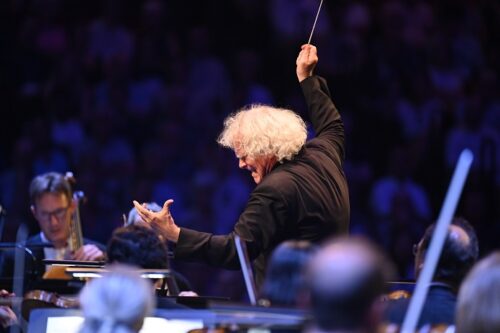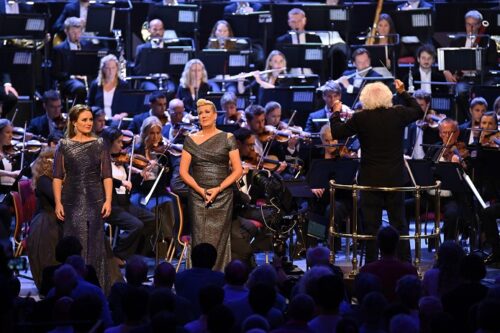
 United Kingdom BBC Proms 2022 [21], Prom 49 – Birtwistle, Mahler: Louise Alder (soprano), Dame Sarah Connolly (mezzo-soprano), City of Birmingham Symphony Orchestra Chorus, London Symphony Chorus, London Symphony Orchestra / Sir Simon Rattle (conductor). Royal Albert Hall, London, 24.8.2022. (CK)
United Kingdom BBC Proms 2022 [21], Prom 49 – Birtwistle, Mahler: Louise Alder (soprano), Dame Sarah Connolly (mezzo-soprano), City of Birmingham Symphony Orchestra Chorus, London Symphony Chorus, London Symphony Orchestra / Sir Simon Rattle (conductor). Royal Albert Hall, London, 24.8.2022. (CK)

Birtwistle – Donum Simoni MMXVIII
Mahler – Symphony No. 2 in C minor, ‘Resurrection’
On the only previous occasion Sir Simon Rattle has performed Mahler’s ‘Resurrection’ Symphony at the BBC Proms (with the Vienna Philharmonic in 1999) he prefaced it with György Kurtag’s brief, explosive Grabstein für Stephan. This time he prefaced it with Harrison Birtwistle’s even briefer Donum Simoni MMXVIII, written – as its title indicates – in 2018 as a present for Rattle and the London Symphony Orchestra. Birtwistle died a week before this year’s Proms programme was announced: before conducting the piece Rattle paid him a warmly affectionate tribute and dedicated the concert to his memory.
Rattle described Donum Simoni as ‘a little tapas of his (Birtwistle’s) whole style’: and so it proved, both in its scoring (for brass, woodwind and percussion) and in its gestures (before the first performance, Rattle told us, Birtwistle had said ‘Don’t pretty it up, Simon’). Near the end of its three minutes the woodwind were allowed to introduce a moment of calm: and when the tuba wound the piece to silence it was less a descent into Stygian gloom, more a settling to rest. Perhaps It served, on this evening, as a suitably gruff Grabstein für Harry – but without Kurtag’s bleakness.
The Mahler Second Symphony that followed was stupendous. Rattle’s credentials as a Mahler conductor – including characteristics that have not won universal approval – are by now well rehearsed: as is the fact that this has been his defining work since he first heard it at the age of 11 (his ‘road to Damascus’ moment, he has called it}. Performances have marked key stages in his career, including the inauguration of his brainchild Symphony Hall, Birmingham, and his farewell concerts before leaving the City of Birmingham Symphony Orchestra – one of which I was lucky enough to attend: it was so powerful that I remember physically shaking for the final 15 minutes.
I recall a critic writing that the finale of Mahler 2 never fails as it is conductor-proof. That may be the case: but it is also true that if the first movement does not deliver shock and awe the performance as a whole cannot reach the heights. Rattle knows this very well. From the beginning there was a compelling sense of urgency, the lower strings digging into their seismic phrases as ferociously (wild) as Mahler intended; the consoling violin melody – a fragile glimpse only in this performance – was brutally brushed aside; the climactic molto pesante, where the entire orchestra seems gripped by a shuddering rictus of horror, stunned both mind and senses; and so on to the haunted, abruptly guillotined end.
The movement threw a long shadow, as it should, over the next two movements and beyond. The graceful Ländler in this context sounded tentative, for all the suaveness of the cellos’ countermelody, and in the troubled central section the dragon stirred again. The ensuing pizzicato passage, which can sound merely charming, was here a ghostly puppet dance. Rattle saw to it that the timpani launching the scherzo crashed in rudely without a pause. Throughout this restless, ironic and destabilising movement, horror was never far away; some of its elements sounded almost hallucinatory – the close harmony trumpet quartet, the dry rattle of the rute , the apparition near the end of a pair of celestial trumpets while the lower strings keep up a mysterious scurrying far beneath.
The senseless activity of the third movement (In ruhig fliessender Bewegung) expires on the hollow sound of the gong: and the solo alto voice emerges magically from the silence, yearning for heaven (‘Urlicht’). Often described as the pivotal moment of the symphony, it did not feel like it here: Dame Sarah Connolly – singing with heart-stopping beauty – was a lone voice in the dark, swept away as all hell broke loose again.
We in the audience have to play our part: we should be unable to believe her vision until she returns (‘O glaube’) to tell us to. In the Finale of the Sixth Symphony, we miss out on the full Mahlerian experience if, knowing how it will end, we give up the struggle as doomed from the outset; conversely, here in the Second, we miss out if we sit back and wait complacently for the peroration to arrive. In a good – a great – performance, it is still in doubt, still all to play for.

Of course, in the end we got there – boy, did we get there – but it was the white-knuckle ride Mahler and Rattle intended. Nor did this performance try to suggest – as Claudio Abbado’s sometimes did – an otherworldly dimension, a spiritual perspective (I remember an Abbado Prom performance where the offstage brass were so remote they were practically inaudible). The drama was immediate, present in the hall; we were caught up in it. The horns and trumpets of the Last Judgement sounded not from afar but from the top gallery, their fanfares clashing over our heads. The LSO were on fire. The famous percussion crescendo went on and on and on until its noise filled the hall. The hushed entry of the massed choirs – the solo soprano (Louise Alder) gently disengaging and floating above – raised the neck-hairs; their climactic affirmations were overwhelming in their intensity and conviction. Bells rang, tam-tams flared, the organ thundered; the extra brass appeared onstage to reinforce their orchestral colleagues. The roof came off the Royal Albert Hall. We, the audience, roared and rose to our feet.
Rattle knew exactly what he wanted, and the LSO and the singers gave him every ounce, and then some. Details remain vivid in the memory – tirelessly gutsy double basses, a spectacular bass drum – but this performance was a mighty whole. Writing this the following afternoon, I have just been informed by Ian Skelly on BBC Radio 3 that when the concert ended social media went mad; and that the BBC technicians arriving to set up for the Late Night Prom were astonished by the palpable energy still vibrating in the air of the hall. So thank you, Sir Simon, for an experience that nobody who was there will ever forget.
Chris Kettle

What impressed me most, and I’m not a Rattle fan, was his reining in the tempo of the final pages; not speeding it up, but rather grinding almost to a halt; I was thrilled. It was my best Mahler 2 ever; and I’ve heard hundreds. I couldn’t believe how much detail I was hearing for the first time; and detail that wasn’t ‘look at me!’ but contributing to a whole. Bravo.
Absolutely, Terence. It was overwhelming, and you are spot on about the impact of vivid detail on the performance as a whole. Did you ever hear Tennstedt perform Mahler 2? I think Rattle’s Prom performance was even finer than his.